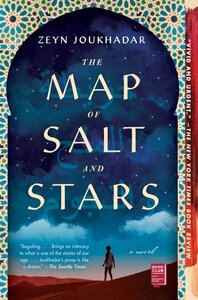Take a photo of a barcode or cover
Dit was echt een prachtig boek! Bij films huil ik snel, bij boeken niet. Dit boek deed mij echt janken als een baby! Wat een tocht maakt Nour door en met een vleugje magie van de middeleeuwse Rawiya.
I carried our memoires all this way, the story of what happened to us. It was heavy on my shoulders this whole time, but I didn’t fall down.
Joukhadar uses dual story lines and two young heroines to tell this story of family, loss, perseverance, grief, love and success. Nour’s story takes place in 2011; she has returned to Syria from Manhattan with her mother and sisters, after her father’s death. But it is not the safe haven her mother expected, because war is tearing the country apart. Rawiya, is a 12th-century girl who, legend has it, disguised herself as a boy to travel with renowned mapmaker al-Idrisi. Her story is the favorite one of Nour’s father’s tales and Nour recites it to herself as a way of keeping her father close. But there are parallels to the girls’ journeys, one as she explores new lands, the other as she flees across many countries to find safety once again.
I liked both Nour and Rawiya, and loved some of the supporting characters. Both girls must navigate through harsh territory and face numerous dangers from both the environment and the people they encounter. Both sometimes rely on being disguised or taken for a boy. Both find an unlikely champion / savior on more than one occasion. I was a little suspicious at first about Abu Sayeed, but came to love him and the gentle way he helped and protected Nour and her family. Like Nour, I relaxed in the safety he provided: I am covered with a thick rind of safety, like an orange.
I did find myself more drawn to Nour’s modern-day story, probably because I’m less inclined towards “fairytales” at this stage of my life. Dual timelines seems to be all the rage in novels these days, as well as dual narrators. But it’s a difficult style to pull off well. Joukhadar is a talented writer, but I felt tossed back and forth, getting invested in one story only to be yanked across centuries to a completely different scenario when I turned the page. I enjoyed the legendary tale but would have preferred to read a book that was set entirely in the present.
Still, Joukhadar gave me a compelling read with well-drawn characters and some interesting parallels. I also rather liked the opening of each part of the novel, where the author gave us a passage from a seemingly ancient text, printed, in each case, in the outline of that country. I checked the author notes but didn’t find any specific citation, so I assume that Joukhadar wrote these passages, rather than quote them. Though they fascinated me, they represented yet another style / storyline to try to get straight within the context of the entire book.
At one point Nour reflects on a scar left on her leg: Life draws blood and leaves its jewelry in our skin. This novel doesn’t draw any blood, but will definitely leave its mark on the reader.
NOTE: Author is a transgender male. The book was originally published with the author listed as Jennifer Zeynab Joukhadar.
Joukhadar uses dual story lines and two young heroines to tell this story of family, loss, perseverance, grief, love and success. Nour’s story takes place in 2011; she has returned to Syria from Manhattan with her mother and sisters, after her father’s death. But it is not the safe haven her mother expected, because war is tearing the country apart. Rawiya, is a 12th-century girl who, legend has it, disguised herself as a boy to travel with renowned mapmaker al-Idrisi. Her story is the favorite one of Nour’s father’s tales and Nour recites it to herself as a way of keeping her father close. But there are parallels to the girls’ journeys, one as she explores new lands, the other as she flees across many countries to find safety once again.
I liked both Nour and Rawiya, and loved some of the supporting characters. Both girls must navigate through harsh territory and face numerous dangers from both the environment and the people they encounter. Both sometimes rely on being disguised or taken for a boy. Both find an unlikely champion / savior on more than one occasion. I was a little suspicious at first about Abu Sayeed, but came to love him and the gentle way he helped and protected Nour and her family. Like Nour, I relaxed in the safety he provided: I am covered with a thick rind of safety, like an orange.
I did find myself more drawn to Nour’s modern-day story, probably because I’m less inclined towards “fairytales” at this stage of my life. Dual timelines seems to be all the rage in novels these days, as well as dual narrators. But it’s a difficult style to pull off well. Joukhadar is a talented writer, but I felt tossed back and forth, getting invested in one story only to be yanked across centuries to a completely different scenario when I turned the page. I enjoyed the legendary tale but would have preferred to read a book that was set entirely in the present.
Still, Joukhadar gave me a compelling read with well-drawn characters and some interesting parallels. I also rather liked the opening of each part of the novel, where the author gave us a passage from a seemingly ancient text, printed, in each case, in the outline of that country. I checked the author notes but didn’t find any specific citation, so I assume that Joukhadar wrote these passages, rather than quote them. Though they fascinated me, they represented yet another style / storyline to try to get straight within the context of the entire book.
At one point Nour reflects on a scar left on her leg: Life draws blood and leaves its jewelry in our skin. This novel doesn’t draw any blood, but will definitely leave its mark on the reader.
NOTE: Author is a transgender male. The book was originally published with the author listed as Jennifer Zeynab Joukhadar.
adventurous
emotional
mysterious
tense
medium-paced
Plot or Character Driven:
A mix
Strong character development:
Yes
Loveable characters:
Yes
Diverse cast of characters:
Yes
Flaws of characters a main focus:
No
adventurous
challenging
dark
emotional
inspiring
reflective
sad
medium-paced
Every place you go becomes a part of you.
Stories are powerful, but gather too many of the words of others in your heart, and they will drown out your own.
Shrapnel is a red word. To me, it sounds like metal and anger and being in the wrong place at the wrong time. It sounds like the red and yellow things inside of people, the fear and rage that rot a person until they rot out somebody else.
Not when I'm older. Just when its time.
Don't forget, stories ease the pain of living, not dying. People always think dying is going to hurt. But it does not. It's living that hurts us.
I can tell by how they stand too far apart that they're leaving room for somebody who isn't there.
Once you've heard too many voices, you start to forget which one is your own.
You are the stories you tell yourself.
If you don't know the tale of where you come from, the words of others can overwhelm and drown out your own. You must keep careful track of the borders of your stories, where your voice ends and another's begins.
Stories map the soul in the guise of words.
Stories are powerful, but gather too many of the words of others in your heart, and they will drown out your own.
Shrapnel is a red word. To me, it sounds like metal and anger and being in the wrong place at the wrong time. It sounds like the red and yellow things inside of people, the fear and rage that rot a person until they rot out somebody else.
Not when I'm older. Just when its time.
Don't forget, stories ease the pain of living, not dying. People always think dying is going to hurt. But it does not. It's living that hurts us.
I can tell by how they stand too far apart that they're leaving room for somebody who isn't there.
Once you've heard too many voices, you start to forget which one is your own.
You are the stories you tell yourself.
If you don't know the tale of where you come from, the words of others can overwhelm and drown out your own. You must keep careful track of the borders of your stories, where your voice ends and another's begins.
Stories map the soul in the guise of words.
adventurous
emotional
reflective
sad
tense
medium-paced
Plot or Character Driven:
Character
Strong character development:
Yes
Loveable characters:
Yes
Diverse cast of characters:
Yes
Flaws of characters a main focus:
No
Such a beautiful book.
dark
hopeful
inspiring
sad
medium-paced
Plot or Character Driven:
Plot
Strong character development:
Yes
Loveable characters:
Yes
Diverse cast of characters:
Yes
Flaws of characters a main focus:
No
adventurous
challenging
emotional
hopeful
inspiring
mysterious
sad
tense
This is a beautiful and heartwarming book about grief, the strength of family and the power of stories. After her father dies, Nour and her family relocate back to Syria, to their mother's home city. The family are no match for war and end up fleeing Syria as refugees. In a parallel story, the legend of Rawiya is told. Rawiya was a brave young scholar who disguised herself as a boy so that she could journey to distant lands. She also battled against a mythical beast, the roc. I was interested to find out at the end of this book that the author had created the legend of Rawiya. Nour has synesthesia and the language the author uses to describe this is really lovely. Also at the end of the book we find out that the author too has synesthesia. Nour's mother is a famed map maker, and the last map she was working on becomes crucial to the story. Rawiya travels the world with Al-Idrisi, a famed map maker of his time who was working on creating a map of the world for his sponsor, King Roger of Sicily. There are many connections between Nour and Rayiwa and I was sad when the book finished as I wanted to know more about their lives.
adventurous
challenging
dark
emotional
reflective
sad
tense
slow-paced
Plot or Character Driven:
Plot
Strong character development:
Yes
Loveable characters:
Yes
Diverse cast of characters:
Yes
Flaws of characters a main focus:
No



